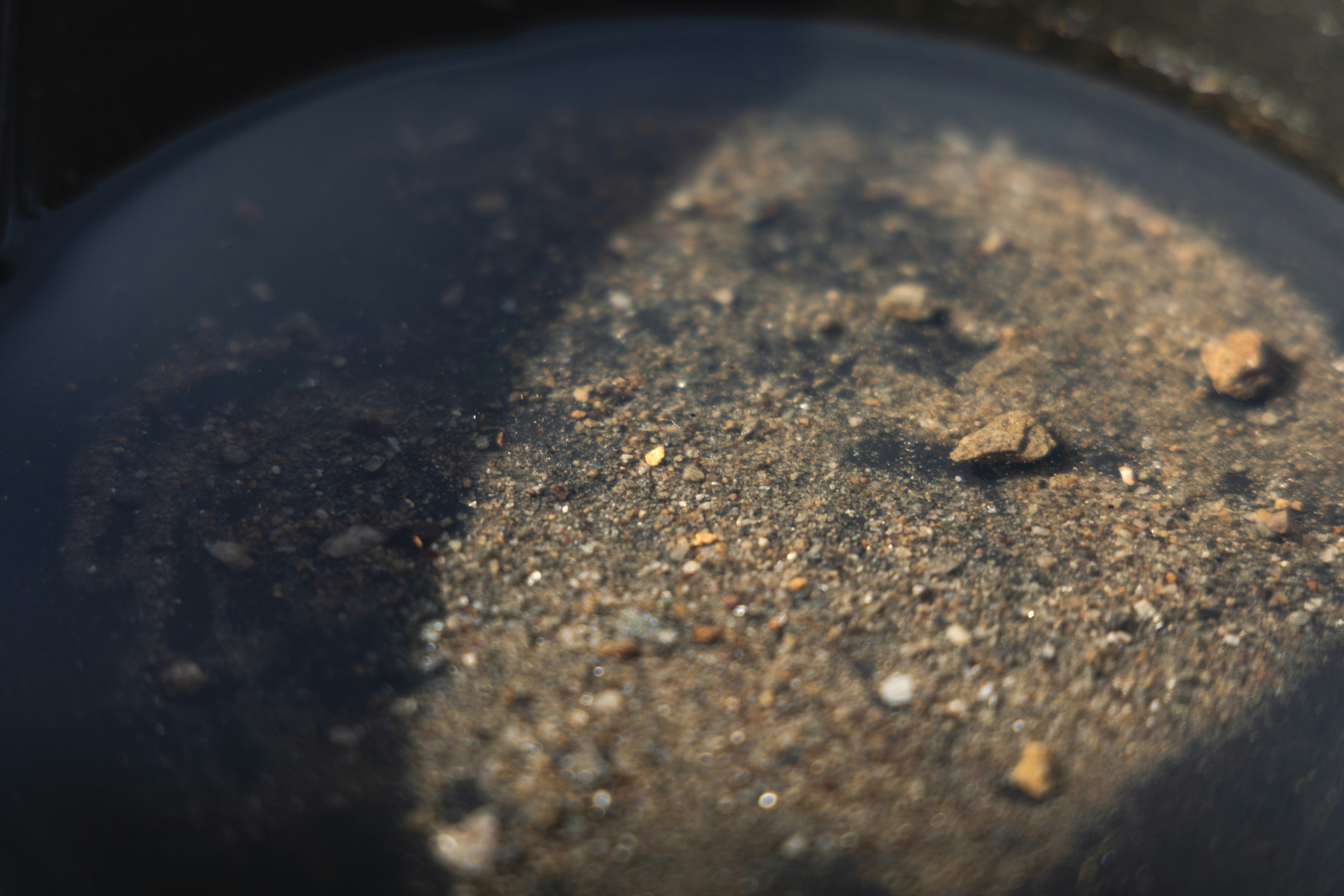
A day
His only desire, he fulfilled it effortlessly each day. He would get up and mentally count the time it took him to do so. He counted the time as if he controlled it even as it slipped away. He knew his age, but he stubbornly refused to be caught off guard by its effects. He engaged his mind and body to keep them alert, vigilant, and aware of the decline that waged war against them. He dressed with poise, and, with meticulous precision, plunged and clenched both fists in his pockets, his left handkerchief rolled into a ball, the one his wife had given him, and his right hand on a small cross that had also been given to him, though he no longer remembered by whom. Reassured by their symbolic presence, he finished getting ready.
He succumbed to another ritual: sitting in his armchair and drinking a bowl of coffee while gazing out the window at the rolling landscape and the gorges that fractured the distance. In this way, he gave free rein to his imagination and the book of his memories. He savored its kaleidoscope of images. He cherished this river of images, one day a tranquil stream, the next a raging torrent; it summarized his life, or rather, sharpened it, restoring to him the extraordinary happiness that shimmered in each of its fragments and providing him with invaluable motivation.
As soon as the well ran dry, he would get up. For a long time, he had considered himself at the service of the book of his life. When and how had this happened? Since his wife's death. With a certain dexterity, he would close the book and not try to return to it, even if his mind urged him to. He managed to lose himself, to bury himself, to forget himself, to forget that he was forgetting. He molded himself like his morning coffee. At first, he thought he was losing himself. The loss of his personality haunted him. Then, he understood. He heard his wife's voice whispering to him what he knew deep down, but which he forbade himself to acknowledge. Since then, he nestled against her words and attuned himself to her memory.
As he closed the book of his life, he did the same with the door of his cabin. He approached the flagpole that stood before his door and raised its colors: a small pennant with a nugget of blossom emerging from a flower. It signaled to his friend, Albert, that all was well and that a new morning was beginning. The two men had known each other for two decades. The old man dined at Albert's house once a month. He would return with a bottle of elixir, for Albert produced his own brandies. Albert was the only soul who found favor in the old man's eyes now that he lived alone. He maintained so many relationships with his departed friends that he no longer wished to forge new ones. Morning and evening, the two friends waved their pennant to tell the other that he was alive. They greeted each other intimately from afar.
The old man then took the path behind the house, careful not to slip on a loose stone. The path meandered through the dry earth across the moor to the river. He was wary of everything. He intensified his concentration as if facing an opponent stronger than himself. The steep path, the blazing sun, and his legs, weaker and less sure, his balance precarious… His body was leaving him. It was moving toward something else. The old man knew this, and he had decided not to worry, to let it be. Why was he still thinking about it? He wasn't going to shout himself hoarse against his body. Who would have shouted at whom? His body would triumph effortlessly. The old man knew it; he couldn't fight it, he didn't try, his body was inevitably slipping away… He accepted it.
The old man set himself a daily routine, always the same one. The path ended and made a bend at that spot, and since he had nimble fingers, he had built a small shack where he kept his gold-panning gear: pipes, bucket, shovel, bat, sieve, gloves… “My tool castle,” as he called it. He never used a metal detector! He refused to. He didn't feel the need. The arrival of technology bored him. He saw it as the source of a will to power, a power that escaped man because everything was delegated to the machine. The gold panner was wary of the will to power; he had seen so many gold panners take refuge in it to excuse their greed. You couldn't last in this line of work when only profit fueled the passion. The old man remembered a crackpot who had taken up gold panning. He arrived with state-of-the-art equipment and set up shop on the opposite bank, facing the old men. He lasted quite a while for a beginner. He wasted away day by day. He used his metal detector indiscriminately. In short, he thought his equipment would compensate for his lack of ambition. He gave up. He disposed of his equipment by leaving it in a recess in the rock. The old man wondered about this. Did he intend to return later to resume his gold panning? Anyone could take that equipment, resell it… The old man couldn't understand why someone would show so little interest in valuable equipment, and even less in their passion. The old man detested fickleness and all forms of superficiality, and he now rarely traveled. "Poisoned fruit ferments in the world that was rushing towards its own destruction," he liked to think.

One Evening
The old man went back up to his house after leaving his weapons in his shed. He lowered his pennant and went inside. He took some dried meat, poured himself a glass of elixir, and sat down in his armchair. He began to rock gently as he ate the meat and slowly sipped the nectar that burned his throat. He watched through the window as the day faded with the slowness of a mist cloud on the plain. He opened his book. He saw his wife enter the house and kiss him on the forehead, pushing his hair back. He dreamed with his eyes wide open. He took endless pleasure in it. Every night. Without exception. The routine changed. He didn't choose it. Nothing else held value for him. Not even that nugget he had found a decade earlier, the one that had established his reputation. A superb 22-carat nugget. Everyone respected him for that reason. He used to say, "The gem calls to you as much as you call to it."
The old man, who was a little younger then, agreed to let a class come and see his work. He had wasted his day, but he enjoyed being surrounded by children and showing them how to use the sieve. Their eyes shone with excitement, for the idea of easy riches intoxicated them. He enjoyed their company until that moment, when the lure of profit blinded them. They were missing the point of research. The teachers realized this too, and the day ended. The old man went home early that day, disillusioned and anxious. He thought that if he had had a child, he would have taught them the value of research, of craftsmanship, he might have said. Yes, that was it, the craft of his trade, this experience constantly challenged by the new day. It kept him alive, and that was priceless… He went to bed, his mind troubled by the negative thoughts of these young people missing out on what truly mattered, on their lives, their real lives, the ones they might never know… It wasn't like him. Sadness couldn't stem his joy. When he thought of his wife, he regretted not having had children with her. That was his only regret. Nostalgia overwhelmed him, but the joy of the moments they had shared surpassed it, like a wave that never recedes and returns to the rocks as if nothing had happened, as if for the first time ever. Nothing could truly touch the old man.
As far back as he could remember, the old man had been searching for gold since childhood. Quite by chance, near a river, when he was a child, he found a nugget the size of a fingernail. He remembered that moment, mesmerized by that tiny glint, captivated by its reflection. Without any tools, without any particular effort, he found a treasure. He had found his calling. He held many positions related to gold after becoming a recognized expert. His life revolved around his passion. And he never hesitated to stop when he passed by a gold-bearing river. His wife would say to him, "It's like you're praying when you're looking for gold." The old man didn't confuse the two. He distinguished between his work and prayer. And he didn't mix them up. But he took his wife's remark as a compliment, because it denoted an intensity, an interiority and a sensitivity like no other.
Why did he keep searching the ore deposits? Because they were calling him, no doubt, but mostly because the old man couldn't resist. He readily admitted it. He didn't need much prompting. "Everyone relives their life until the very last second," he liked to say. He considered himself a rather good actor.

A new day
Every gesture he made brought him closer to his wife. Since losing her, the old man, mindful of his circumstances, didn't rush things. He avoided temptations. When he discovered the gem that would cement his fame, he sifted through the glory that threatened to intoxicate him. He placed his trust in the future, and for him, the future materialized in his reunion with his wife. He wasn't particularly religious, but if hope meant anything, it animated every second of his life.
The old man plunged both hands into his pockets to begin. He grabbed his characteristic shovel with its triangular handle and headed toward a large, gnarled stone, then his attention shifted to the roots a little further on, which he had been eyeing for some time. He moved an old stone that blocked the entrance to the roots, "a small mangrove," he thought, recalling a distant but vivid trip to the Caribbean. He tossed his shovel, hunched over as if in a martial stance, and deposited the contents into the sieve resting on the bucket. He repeated the motion several times. As usual, the more he did it, the more a wave of freedom enveloped him. He shook the sieve. He straightened up. He looked at the effect of his work and saw that the place belonged to him, the hand of man upon nature, but tomorrow nature would reclaim it. Nature and man traded blows, and neither would win, he was sure of it. He vigorously threw his shovel back into the pan, stirred the sieve with fervor, laid down the gold-panning mat, and scattered what he had dug. He scrutinized the deposits in the crevices. He waited patiently. He observed. A fervor gripped him today. He had "the soul of a beginner," he thought. He saw crucial importance in this. To keep this youthful spirit. He straightened up. All this had yielded nothing. He thought his enthusiasm was feigned. He knew it was possible, that the mind could be intoxicated by nothing and deceive us. The froth of what we are stirs in our emotions.
He remembered another gold panner who had come to this river. He attracted curious onlookers. Everyone knew he lived there and continued to search for gold in that spot, and in people's minds, it was simple: if the old man who had found so many nuggets was looking for gold there, then there must be gold there. People didn't care whether the old man found gold; his reputation alone worked for him, without him having to do anything. Besides, he still lived frugally… But no one worried about that. This young gold panner settled in as if he owned the place. Very quickly, the old man noticed his talent in his movements, his way of doing things that didn't come from experience; but this talent was unknown to him, and only the old man could attest to it. This young man, enamored with himself, didn't delve any deeper. He would have liked to educate him, but it wasn't his job. He wondered for a long time whether he was acting correctly. Should he tell him he had talent and guide him? Unfortunately, he didn't have time to decide. The young man found a magnificent nugget. He stood on the other side of the riverbank and watched the old man. The old man smiled at him. He knew that feeling, which was more than just a feeling, but which threatened to tip very quickly into the will to power. The old man saw him tip, and he never saw him again. Sadness filled him, because this young man was mistaken on one point: he possessed a talent he believed to be his own, when in fact it had been given to him. "Without gratitude, there was nothing to hope for in this life." Gratitude was the indispensable safe passage. It took him a long time to recover from the loss of this companionship; he dreamed that he had spoken to the young man, that he had warned him against the will to power, against vanity. He straightened up, buried his hands in his pockets, and clutched his fetishes.
The old man decided the roots no longer offered any flavor. He turned and found himself graceful as he swam back to the other side. He stepped over large stones he didn't recognize and promised himself he'd save their discovery for another day. As soon as he reached the other side, a sharp pain pierced his liver. He paid it only cursory attention, still basking in the euphoria of his newfound slenderness. But the pain intensified. It waged a battle he hadn't seen coming, one that took him by surprise. So much so that it broke free and pierced him completely when he thought he'd finished this round. He berated himself for having let his guard down. A single moment had been enough. What was that moment in the grand scheme of his life? He was losing the game for a quarter of a second of inattention, of carelessness… “a kind of will to power,” he thought. He fell to the ground like the stones he had been throwing back into the water. He lay inert, trapped within his own body, on the riverbank with no other option. A little water lapped his face. Inert, he appreciated the new sight of the river, so friendly and tender towards him. It was saying goodbye. The old man still had time to reach up to his pocket to grasp the hard ball of his handkerchief, his elbow under his head, and he opened the book of his life one last time. He listened to the river in a way he hadn't known before. He told himself that there was always something to learn from this life. He told himself that he wouldn't lower his flag tonight and that Albert would come and raise it again. He kept his eyes open for a few more seconds, just long enough to see his wife approach. He closed the book.
One day later
Albert carried the old man with the help of his two sons. The three of them took turns keeping vigil over the body for a day and a night, as was the custom. With their continued help and that of the undertaker, he laid the old man in the coffin. He ran his hand over his face, lingering on his forehead. With authority, Albert took the small cross from his right pocket, and from his left, he pulled out the handkerchief, rolled into a ball, which he began to unravel. After a moment, the handkerchief revealed a splendid nugget, proud and magnificent. The two sons and the undertaker stared wide-eyed at this sight, which they had not expected in the least. Albert put the handkerchief back in his pocket, placed the cross and the nugget on the old man's heart, and folded his hands over his two treasures. The coffin was closed. Albert gazed at the closed coffin as if it were about to reopen.

Leave a comment